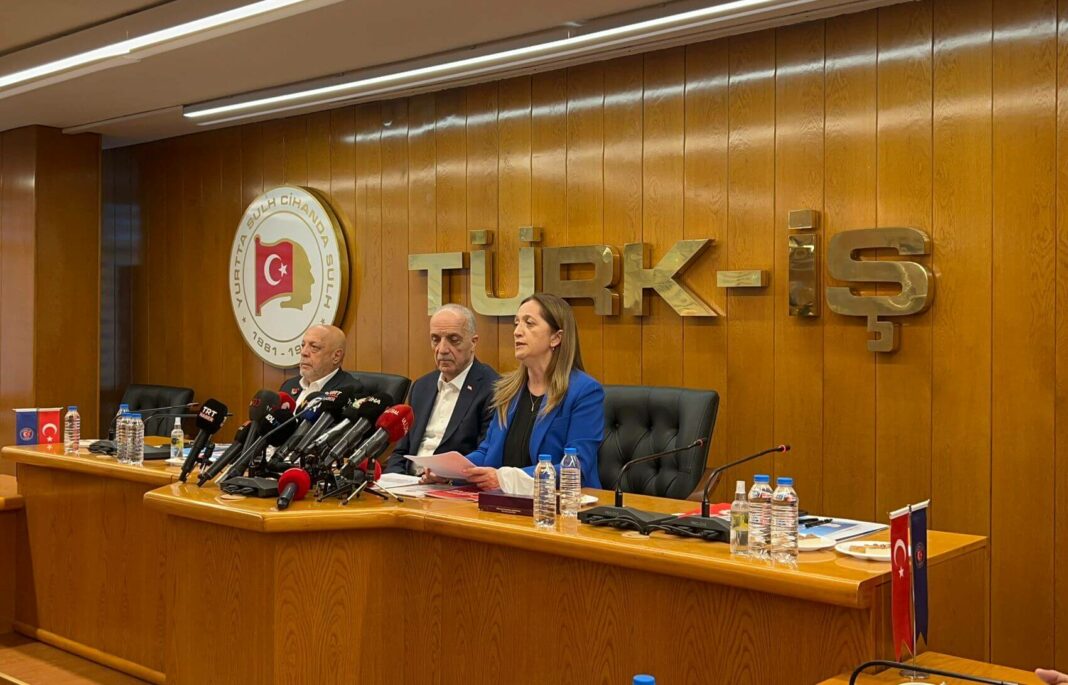The presidents of three major labor unions in Turkey have made a joint call to the government to increase wages and pensions by a “decent” amount and to avoid further subjecting wage earners and pensioners to the economic hardship caused by the high cost of living.
Confederation of Revolutionary Workers’ Unions (DİSK) Secretary-General Arzu Çerkezoğlu, head of the Confederation of Turkish Trade Unions (TÜRK-İŞ) Ergün Atalay and Confederation of Turkish Real Trade Unions (HAK-İŞ) Chairman Mahmut Arslan held a joint news conference at TÜRK-İŞ headquarters in Ankara on Tuesday at which they announced a 10-article to-do list for the government for the improvement of wages, pensions and working conditions.
The labor union leaders’ call to the government comes against the backdrop of the refusal of the ruling Justice and Development Party (AKP) to make an interim increase in the minimum wage and the recently announced six-month rate of inflation by the Turkish Statistical Institute (TurkStat).
The six-month inflation rate is used to determine increases in the salaries of civil servants and pensions for the second half of the year.
According to TurkStat, the rate of inflation for June was reported at 1.64 percent, with an annual rate of 71.60 percent. The six-month inflation rate was calculated at 24.73 percent. However, labor unions argue that these figures fail to capture the real increases in the cost of living, accusing TurkStat of underreporting inflation to the disadvantage of civil servants and pensioners.
TÜRK-İŞ’s Atalay said it is not possible to meet the needs of one’s family for even one week, let alone one month, on the minimum wage of TL 17,000 ($518), or on a TL 10,000 ($304) monthly pension.
He said neither wage earners nor labor unions find TurkStat’s figures “realistic” since the price tags in supermarkets say everything about the high level of inflation in the country.
“While 20 percent of the people live in prosperity in Turkey, 80 percent pay for it,” said Atalay.
The current minimum wage of 17,002 Turkish lira is already below the hunger threshold of 18,980 lira, as calculated by the TÜRK-İŞ.
The hunger threshold, which is defined as the amount of money that a family of four living in the capital city of Ankara needs to spend for healthy and balanced nourishment, was TL 18,980 ($580) in June, nearly TL 2,000 above the minimum wage of TL 17,002, according to data from the TÜRK-İŞ.
Arslan, the president of HAK-İŞ, which is close to the ruling AKP, has, however, avoided directly criticizing the government for its management of the country’s economy. He claimed that although macroeconomic indicators show a positive trajectory in the economy, industrial production is operating at full speed and the level of unemployment is dropping, the wages of laborers are not increasing accordingly.
“Turkey does not deserve this. Wages are decreasing. There is something wrong here,” said Arslan.
DİSK’s chairperson, Çerkezoğlu, held the policies of the AKP government responsible for economic problems including the high cost of living. She said although Turkey’s resources are sufficient for its 85 million population to live in prosperity, the lack of equal distribution of resources, unfair taxation and the lack of the rule of law and democracy condemn laborers to live with economic hardship.
“We can solve this problem [of the high cost of living] if all groups in the society, mainly the laborers, have a say all the time and not only before elections,” said Çerkezoğlu.
In their 10-article list the labor unions called on the government to ensure fair taxation, reduce the tax burden on wage earners, increase wages in line with real inflation figures, urgently increase the minimum wage, end inequality in wages in the public sector, match the lowest pension to the minimum wage, allow workers to join a trade union without the fear of dismissal and end discrimination in the workplace.
Labor Minister Vedat Işıkhan last month ruled out an interim increase in the minimum wage for the second half of 2024, maintaining the government’s position that frequent wage hikes could exacerbate inflation.
Labor unions say wage earners cannot be made to suffer from the consequences of high inflation and that the government should seek other ways to curb inflation rather than depriving laborers of an increase in wages.
Finance Minister Mehmet Şimşek also sparked controversy earlier this month by claiming that Turkey’s minimum wage is the highest among developing countries, a statement met with skepticism from labor groups.


